Culture shock 文化冲突英语交流演讲稿
处理文化冲击英文作文
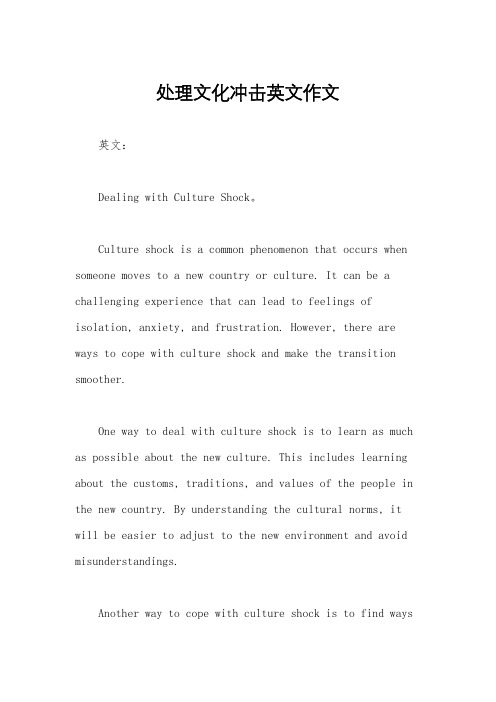
处理文化冲击英文作文英文:Dealing with Culture Shock。
Culture shock is a common phenomenon that occurs when someone moves to a new country or culture. It can be a challenging experience that can lead to feelings of isolation, anxiety, and frustration. However, there are ways to cope with culture shock and make the transition smoother.One way to deal with culture shock is to learn as much as possible about the new culture. This includes learning about the customs, traditions, and values of the people in the new country. By understanding the cultural norms, it will be easier to adjust to the new environment and avoid misunderstandings.Another way to cope with culture shock is to find waysto connect with the local community. This can be done by participating in cultural events, joining clubs or organizations, or volunteering. By getting involved in the local community, it will be easier to make new friends and feel more at home.It is also important to maintain a positive attitude and be open-minded. It can be easy to become frustrated or overwhelmed when faced with unfamiliar situations, but by keeping an open mind, it will be easier to adapt to the new culture.In my personal experience, when I first moved to China, I experienced culture shock. I found it difficult to adjust to the different customs and traditions. However, I made an effort to learn as much as possible about the Chinese culture. I also joined a language exchange group and volunteered at a local school. Through these experiences, I was able to make new friends and feel more at home in my new environment.中文:处理文化冲击。
积极面对文化冲击英语作文
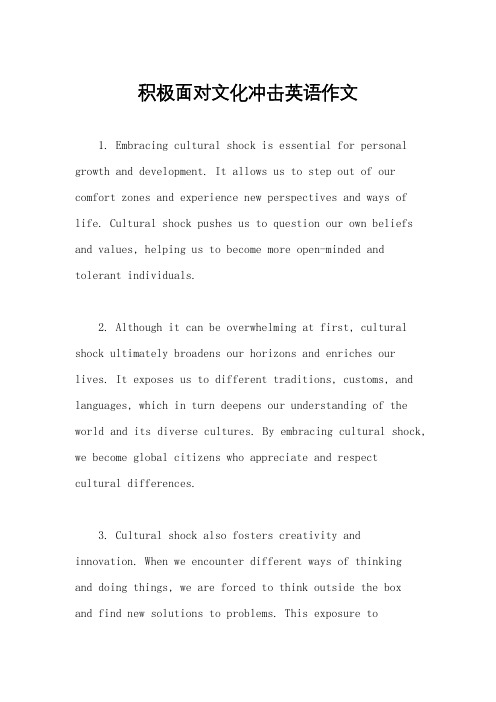
积极面对文化冲击英语作文1. Embracing cultural shock is essential for personal growth and development. It allows us to step out of our comfort zones and experience new perspectives and ways of life. Cultural shock pushes us to question our own beliefs and values, helping us to become more open-minded and tolerant individuals.2. Although it can be overwhelming at first, cultural shock ultimately broadens our horizons and enriches our lives. It exposes us to different traditions, customs, and languages, which in turn deepens our understanding of the world and its diverse cultures. By embracing cultural shock, we become global citizens who appreciate and respectcultural differences.3. Cultural shock also fosters creativity and innovation. When we encounter different ways of thinkingand doing things, we are forced to think outside the boxand find new solutions to problems. This exposure todiverse perspectives can spark inspiration and lead to breakthrough ideas and inventions.4. Moreover, cultural shock teaches us resilience and adaptability. It challenges us to navigate unfamiliar environments and situations, forcing us to develop coping mechanisms and problem-solving skills. These skills are not only valuable in dealing with cultural shock but also in other aspects of life, such as career challenges or personal relationships.5. It is important to note that cultural shock is not a one-time experience but a continuous process. As we encounter new cultures and immerse ourselves in different environments, we may face multiple instances of cultural shock. However, each experience builds upon the previous ones, making us more equipped to handle future challenges and adapt to new cultural contexts.6. Lastly, embracing cultural shock allows us to form meaningful connections with people from different backgrounds. By understanding and appreciating theircultures, we can bridge gaps and foster mutual respect and understanding. These connections not only enrich our personal lives but also contribute to a more harmonious and inclusive society.In conclusion, embracing cultural shock is crucial for personal growth, creativity, adaptability, and fostering meaningful connections. It allows us to become more open-minded, tolerant, and globally aware individuals. So, let us embrace cultural shock with open arms and embrace the opportunities it brings.。
对待文化冲击英文作文
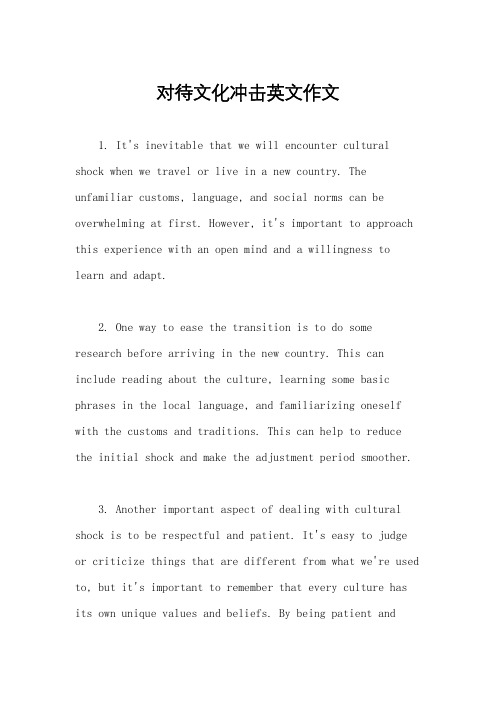
对待文化冲击英文作文1. It's inevitable that we will encounter cultural shock when we travel or live in a new country. The unfamiliar customs, language, and social norms can be overwhelming at first. However, it's important to approach this experience with an open mind and a willingness to learn and adapt.2. One way to ease the transition is to do some research before arriving in the new country. This can include reading about the culture, learning some basic phrases in the local language, and familiarizing oneself with the customs and traditions. This can help to reduce the initial shock and make the adjustment period smoother.3. Another important aspect of dealing with cultural shock is to be respectful and patient. It's easy to judge or criticize things that are different from what we're used to, but it's important to remember that every culture has its own unique values and beliefs. By being patient andopen-minded, we can learn to appreciate and respect these differences.4. Communication is also key in dealing with cultural shock. It's important to ask questions and seekclarification when we don't understand something, rather than assuming or making assumptions. This can help to avoid misunderstandings and foster better relationships with the local community.5. Finally, it's important to remember that cultural shock is a natural part of the process of adapting to a new culture. It may take time to fully adjust, but with an open mind, patience, and a willingness to learn, we can overcome the challenges and embrace the richness and diversity of the new culture.。
有关文化冲击英文作文

有关文化冲击英文作文英文:Culture shock is a common phenomenon that occurs when one is exposed to a different culture. It can be a resultof moving to a new country, traveling abroad, or even interacting with people from different cultural backgrounds. As someone who has experienced culture shock firsthand, I can say that it can be both exciting and overwhelming.One of the biggest challenges of culture shock is the language barrier. When I first moved to China, I struggledto communicate with the locals. I had to learn Mandarinfrom scratch, which was not easy. Even though I had studied the language before coming to China, I found it difficultto understand the different accents and dialects. However, as time went on, I became more comfortable with the language and was able to communicate more effectively.Another challenge of culture shock is the differencesin social norms and customs. For example, in China, it is common to slurp your soup or noodles, which is considered impolite in Western culture. I also had to get used to the concept of "saving face" in China, which means avoiding public embarrassment or shame. In Western culture, it is more acceptable to express your emotions openly.Despite the challenges, culture shock can also be a positive experience. It allows you to broaden your perspective and learn about different cultures. For example, I have learned to appreciate the importance of family and community in Chinese culture. I have also tried new foods and experienced different traditions and celebrations.Overall, culture shock is a natural part ofexperiencing different cultures. It can be difficult at times, but it also provides an opportunity for personal growth and learning.中文:文化冲击是当一个人接触到不同文化时常见的现象。
有文化冲击的英语作文

有文化冲击的英语作文英文:Cultural shock is a common experience when one travels to a different country or interacts with people from a different culture. I have personally experienced cultural shock when I first moved to the United States from China.One of the biggest cultural differences I noticed was the concept of personal space. In China, people tend to stand closer to each other and physical contact is not seen as a big deal. However, in the United States, people prefer to keep a certain distance from each other and physical contact is only acceptable between close friends or family members. I remember feeling uncomfortable when someone I barely knew hugged me.Another cultural difference I noticed was the way people communicate. In China, people tend to be more indirect in their communication, especially when it comesto expressing negative emotions or opinions. However, inthe United States, people tend to be more direct and straightforward in their communication. I remember being shocked when my American roommate told me that she didn't like the food I cooked.Despite the initial discomfort and confusion, I learned to adapt to the cultural differences and appreciate the diversity. I also realized that cultural shock is a two-way street. Just as I was experiencing cultural shock in the United States, my American friends and colleagues were also experiencing cultural shock when they visited China or interacted with me.中文:文化冲击是当一个人到另一个国家旅游或与来自不同文化的人交往时的常见经历。
关于中国文化冲击英语作文
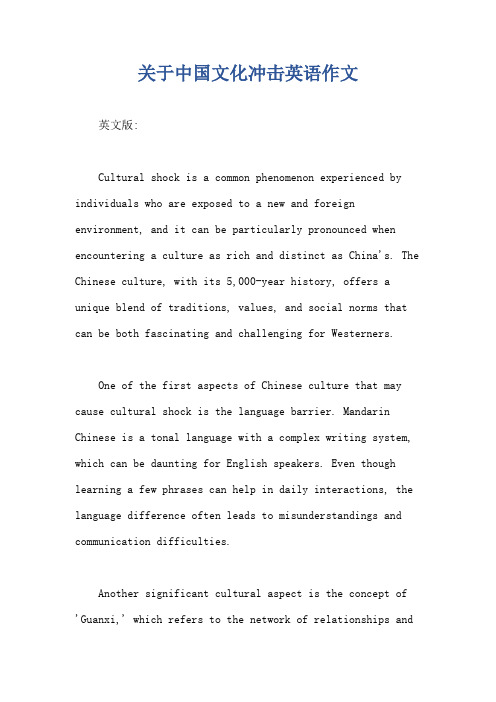
关于中国文化冲击英语作文英文版:Cultural shock is a common phenomenon experienced by individuals who are exposed to a new and foreign environment, and it can be particularly pronounced when encountering a culture as rich and distinct as China's. The Chinese culture, with its 5,000-year history, offers a unique blend of traditions, values, and social norms that can be both fascinating and challenging for Westerners.One of the first aspects of Chinese culture that may cause cultural shock is the language barrier. Mandarin Chinese is a tonal language with a complex writing system, which can be daunting for English speakers. Even though learning a few phrases can help in daily interactions, the language difference often leads to misunderstandings and communication difficulties.Another significant cultural aspect is the concept of 'Guanxi,' which refers to the network of relationships andconnections that play a crucial role in Chinese society. It is a system that values personal relationships over individual achievements and can be confusing for those accustomed to the more individualistic Western culture.The concept of 'face' or 'Mianzi' is also central to Chinese culture. It involves maintaining one's reputation and dignity in social interactions, and it can influence behavior in various ways. For example, public criticism is avoided, and indirect communication is often preferred to save face.Social etiquette in China also differs from Western norms. For instance, the practice of giving and receiving business cards with both hands and the importance of seniority in social settings are customs that may seem unusual to foreigners.Food is another area where cultural differences are evident. Chinese cuisine is diverse and often involves flavors and ingredients that are unfamiliar to Western palates. The practice of sharing dishes and the use ofchopsticks can also be a new experience for many.Lastly, the Chinese approach to time can be a source of cultural shock. The Chinese concept of time is morecircular and less linear than in the West, which can lead to different attitudes towards punctuality and scheduling.In conclusion, the cultural shock experienced when encountering Chinese culture is multifaceted, involving language, social norms, and values. It requires patience, open-mindedness, and a willingness to learn and adapt. Embracing these differences can lead to a deeper understanding and appreciation of the rich cultural tapestry that is China.中文版:文化冲击是一个常见的现象,尤其是当人们接触到一个全新且陌生的环境时。
文化冲击作文 英文

文化冲击作文英文英文:Culture shock is a common experience for people who travel or move to a new country. It can be defined as the feeling of disorientation and discomfort that arises from being immersed in a culture that is different from one's own. I have personally experienced culture shock when I moved from China to the United States for college.One of the biggest differences I noticed was the communication style. In China, people tend to be more indirect when communicating, using subtle hints and nonverbal cues to convey their meaning. However, in the United States, people are much more direct and straightforward in their communication. I found myself struggling to understand the meaning behind what people were saying, and often felt like I was being too blunt or rude in my own communication.Another aspect of culture shock for me was the food. In China, we eat a lot of rice and noodles, and our meals are often centered around family-style dishes. However, in the United States, there is a much wider variety of foods available, and meals are often more individualized. I found myself missing the comfort and familiarity of my favorite Chinese dishes, and struggled to find new foods that I enjoyed.Despite these challenges, I found that I was able to adapt and learn to appreciate the differences between Chinese and American culture. I made friends with people from all over the world, and we shared our experiences and cultures with each other. I also found that by trying new foods and exploring new places, I was able to broaden my horizons and gain a deeper understanding of the world around me.中文:文化冲击是一个常见的经历,对于那些旅行或移居到新国家的人来说。
文化冲击中英文作文
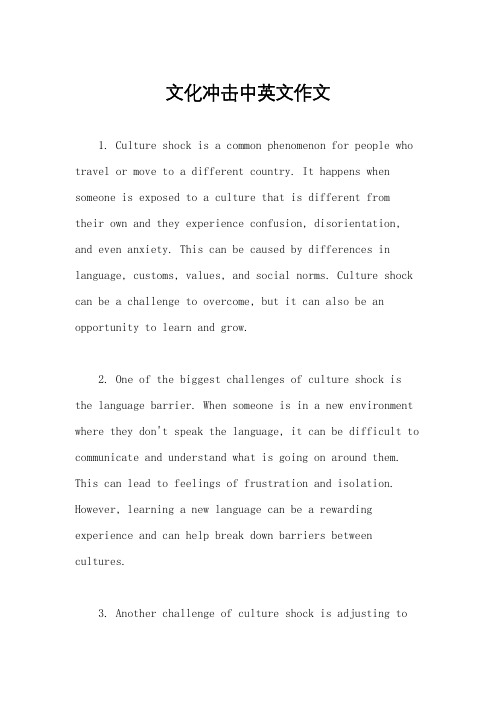
文化冲击中英文作文1. Culture shock is a common phenomenon for people who travel or move to a different country. It happens when someone is exposed to a culture that is different fromtheir own and they experience confusion, disorientation, and even anxiety. This can be caused by differences in language, customs, values, and social norms. Culture shock can be a challenge to overcome, but it can also be an opportunity to learn and grow.2. One of the biggest challenges of culture shock is the language barrier. When someone is in a new environment where they don't speak the language, it can be difficult to communicate and understand what is going on around them. This can lead to feelings of frustration and isolation. However, learning a new language can be a rewarding experience and can help break down barriers between cultures.3. Another challenge of culture shock is adjusting todifferent customs and social norms. For example, in some cultures it is considered rude to be on time, while in others it is expected. In some cultures, it is customary to greet someone with a kiss on the cheek, while in others a handshake is more appropriate. These differences can be confusing and may take some time to get used to.4. Values can also vary greatly between cultures, and this can cause culture shock. For example, in some cultures, individualism is highly valued, while in others,collectivism is more important. This can affect everything from the way people interact with each other to the waythey approach work and education. Understanding these differences can help reduce culture shock and promotecross-cultural understanding.5. Finally, culture shock can be exacerbated by homesickness and feelings of nostalgia for one's own culture. It can be difficult to adjust to a new culture and leave behind the familiar comforts of home. However, it is important to remember that culture shock is a normal partof the process of adapting to a new environment, and thatwith time and effort, it is possible to overcome it and embrace the new culture.。
- 1、下载文档前请自行甄别文档内容的完整性,平台不提供额外的编辑、内容补充、找答案等附加服务。
- 2、"仅部分预览"的文档,不可在线预览部分如存在完整性等问题,可反馈申请退款(可完整预览的文档不适用该条件!)。
- 3、如文档侵犯您的权益,请联系客服反馈,我们会尽快为您处理(人工客服工作时间:9:00-18:30)。
Culture shock is ubiquitous, not only between different countries, but also within the same country.
Let me share with you some examples of what I have experienced and understood.
First of all, I have some personal experiences. I want to say what impressed me the most about Wuhan. I think it should be the bus driver in Wuhan. Here, bus drivers rarely show courtesy to pedestrians. Even if you are two meters away from him, he will sound the horn to remind you to leave mand wait. Wuhan bus drivers even boarded hot searches on Weibo for a while.
Another thing is about the difference in diet between the North and the South. Before I went to university, I didn’t know that I should eat dumplings on the winter solstice. After I was in college, I learned that I should eat dumplings on the winter solstice when I got along with some northerners in the school. This is a very novel experience.
In addition, in the process of reading, I also learned some differences at home and abroad. Here are two examples.
The first one is individualism and collectivism. Western culture is based on individualism rather than on collectivism. For instance, in the US, they always talk about individual rights, instead of placing the whole society above your own self. This is clearly different in China where a country, society or family are placed above yourself.
The other is about diet. In China, we prefer noodles, rice, dumplings as the staple food. We like cooking a lot of delicious dishes, then we set up the tables, put the dishes on the tables, sit together, and taste the dishes together, we don’t eat with individual plates, when we eating ,we like chatting and laughing, we think it’s warm and happy to eat this way; But in west countries, people like eating hamburgers, chips, pizza, as their staple food, they eat them with vegetable salad, they eat with drinking (water or juice), and they eat with separate plates. In China, we become full up when we finish all the food, then we don’t eat anything, but in west countries, people eat desserts after they finish their meals.
We know that different living habits and different cultural backgrounds will bring a lot of cultural shock, so how should we deal with it?
First of all, before we arrive at an unfamiliar city, we must learn about the local cultural background, food, transportation, customs and other information in advance. This will help reduce the unaccustomed and psychological gaps when newcomers arrive. Then take the initiative to communicate with the locals, just ask if you don’t understand, and try to overcome shyness and restraint. Believe it, the locals will help you.
The second is to try to integrate into the local circle of interest. For example, if you have hobbies such as football, basketball, music, dancing, photography, painting, etc., there are also a lot of like-minded friends in the local area! Using the same hobbies as an opportunity to make more friends to integrate into the local area will always let you find a sense of belonging.
Of course, if you are really hit by Culture Shock, don't be frustrated or afraid. First, you must face it with an optimistic attitude! After all, studying and living in the local area is not overnight, you have to get used to it! At this time, find good friends to talk to, communicate and resolve troubles together! In fact, we will encounter big and small problems at all stages of life. If we communicate and encourage each other, our mood will naturally
be much better.
Finally, don’t be afraid when encountering Culture Shock. Tell the people around you about your feelings and stress. It will be really help.。
